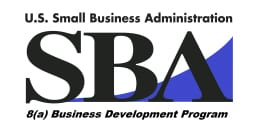
ARA Consulting is the most experienced and knowledgeable team of SBA 8(a) Program certification consultants in the Nation. Our SBA 8(a) assistance services walk you through every step of the 8(a) application process.
If we take on your case, you will get your 8(a) certification on the first attempt.
Joe Donnini is the nation's preeminent expert consultant on 8(a) eligibility. He ran the SBA 8(a) certification and eligibility office for 27 years. During that time, Joe personally reviewed more than 35,000 8(a) applications. It was Joe who made SBA's approval or denial recommendation for each one.
Joe's level of inside experience and knowledge is one-of-a-kind. No one else even comes close.
Alanson Anderson is the founder of the practice. He is the expert consultant with the longest track record in the nation of helping clients to prepare successful SBA 8(a) applications.
Since 1983, Alanson has provided assistance a vast number of small disadvantaged businesses to overcome 8(a) application obstacles and gain access to 8(a) program Federal contracting opportunities.
Sadly, that is what happens to nearly all self-prepared 8(a) applications. But it is entirely unnecessary and entirely avoidable. Here is what we offer you:

Obtaining SBA 8(a) certification is a complex and rigorous process. Trying to get through that process without expert help is usually an expensive mistake that results in wasted time and lost opportunities. But there is a better - and ultimately less costly - way to get it done.
Imagine if it were possible to have your 8(a) application prepared by SBA itself - and not just someone at SBA, but by the very person who would be reviewing it and deciding its outcome. And imagine if that person's only goal were to make sure that your application got approved on the first try.
Well, if we take on your 8(a) application case, that is essentially what you will get. Joe Donnini was exactly that person for 27 years. It will be as if SBA itself were helping you to get successfully 8(a) certified.
Simply stated, you will not find expertise like that anywhere else. Absolutely no one in private practice knows more about SBA 8(a) eligibility or about the application and certification process. No one else has the same first-hand, inside knowledge of how SBA analyses 8(a) applications and what can be done to successfully and legally overcome eligibility issues. And no consulting practice has a longer or more successful track record.
The first step in our 8(a) assistance process is to find out if you can qualify for 8(a) certification. Please contact or call us to discuss your particular situation. We will perform a comprehensive eligibility analysis at no charge, and if there is a way you can successfully become 8(a) certified, we'll tell you. If you cannot qualify, we'll let you know that as well. Please click here for the CONTACT FORM and we will get back to you promptly.
Or, if you prefer, our toll free phone number is (888) 440-5562.

You can - but you will wish you hadn't. Less than 1% of applications succeed on the first try without expert help. SBA's regulations concerning eligibility are far more complex than applicants realize. And SBA's application system does not provide any useful guidance. In fact the system actually leads applicants to submit incomplete applications. So without expert help, you can count on getting your 8(a) application returned to you unprocessed. That will mean starting over.
Months of time gets wasted when SBA returns 8(a) applications unprocessed due to missing elements or eligibility irregularities. SBA's system only asks for a portion of the documents required by law, so applicants think they have submitted a complete application -- but they haven't. They only find out when their application is rejected for processing. And even if they do know they have some eligibility complications that need addressing, very few know how to do that in a way that SBA will accept.
SBA's Official Policy: SBA's official policy is that applicants can apply for 8(a) certification without help. But 8(a) applications prepared and submitted without expert guidance almost never get through SBA's application process on the first try. Instead, they get designated as deficient and kicked back to the applicant without further processing.
SBA refers to this as "returning" an 8(a) application. It does not mean that SBA has formally denied the application. But it does mean that they will not take any further action on it. And it happens to self-prepared and submitted applications close to 100% of the time.
Can you re-apply? Yes you can. And a fair number of applicants do re-apply. Yet many others simply drop the whole thing. That is especially true for those that have had their applications returned more than once - unfortunately, a common occurrence.
What will you need? For you to successfully re-apply, you will need to provide SBA with everything the regulations require and address all of SBA's questions and concerns to their satisfaction. In order to do that, you will need to understand exactly what SBA wants to see and what their concerns are likely to be in your particular case.
Treated as a new submission: Your re-submitted 8(a) application will be treated as a new submission. That means it goes back into the queue and waits its turn to be screened again. That will typically add several months to the process.
It may get returned again: If SBA finds that the application is still not complete, or still has inadequately addressed issues, they will return it again . That happens a lot. Each time it adds more months to the process We get many calls from frustrated applicants who have made repeated unsuccessful attempts to get 8(a) certified and have now decided to seek expert help to get it done correctly.
The reason SBA returns so many applications.Poor application system design. The SBA online CERTIFY system has serious design flaws that cause applicants to submit incomplete applications that cannot be processed. The system asks applicants to upload some - but not all - of the documents that SBA regulations require for an 8(a) application. Worse, the system does not offer any way to upload the other needed documents (unless you know how to get around that). So applicants think they have submitted a complete application - but they haven't.
SBA is understaffed and backlogged. Every year, they get hundreds upon hundreds of 8(a) applications that are incomplete, inconsistent, have unresolved eligibility issues, or are otherwise inadequate for thorough analysis. Applications that have been prepared and submitted by the applicants themselves nearly always are found deficient.
No chance of approval: Since those 8(a) applications would be denied if processed as submitted, SBA simply returns them without further action taken. That way they avoid using up the staff time needed to perform a full analysis and formal denial on each one.
Could have been approved: The sad thing is that the majority of the applications SBA returns could have been processed and ultimately approved on the first attempt with proper eligibility screening and step-by-step guidance from an expert.
Applying for SBA 8(a) certification is not a good DIY project.Comprehensive and detailed: Few applicants realize just how comprehensive and detailed an 8(a) application needs to be. Very few have in-depth knowledge of the 8(a) regulations. Almost none are familiar with the most recent court decisions and how they affect SBA's interim eligibility rules. And absolutely none have the inside SBA experience or the years of assisting applicants to successfully obtain 8(a) program certification that we have.
Some things are best left to experts: While applicants are often subject matter experts in their own fields, they simply are not experts on SBA 8(a) matters. The 8(a) eligibility rules and the application process are far too complex - and the outcome far too critical to the business development goals of applicants - to be taken on as a DIY project by someone who is tackling it for the first time. There are good reasons we go to accountants, lawyers, doctors, dentists and other specialists. The same applies in this case.
Doing it yourself will cost you more: You will not save any money by attempting to apply for 8(a) certification on your own. In fact it will cost you many times more in the long run.
First, you will invest a great deal of your valuable time in the repeated attempts -- much more than if you got expert help to do it correctly and efficiently. And your time is absolutely not free.
Second, during those wasted months, and sometimes years, you will lose out on important 8(a) opportunities. That can add up to hundreds of thousands of dollars in lost business.